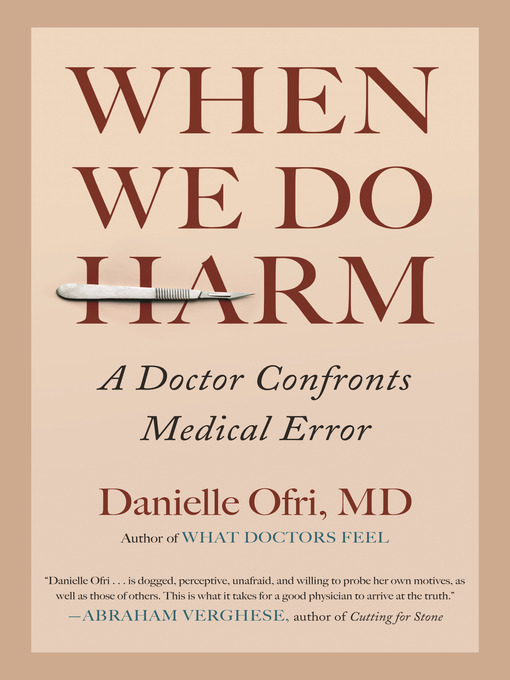
When We Do Harm
A Doctor Confronts Medical Error
خطای پزشکی دکتر کانید
کتاب های مرتبط
- اطلاعات
- نقد و بررسی
- دیدگاه کاربران
نقد و بررسی

February 15, 2020
A doctor examines the causes behind medical errors and how to minimize them. Ofri is a clinical professor at NYU School of Medicine who has also treated patients at Bellevue Hospital for more than 20 years, and her popular books about medicine and the doctor-patient relationship include What Doctors Feel and What Patients Say, What Doctors Hear. In her latest, she combines extensive research with stories of patients who have been harmed and enhances the narrative with details of her own disconcerting experiences as a clinician. What makes this book special is Ofri's perceptive and compassionate nature; she sees her own patients as real people and is candid with readers about her concerns and vulnerabilities. The heart of the narrative focuses on the cases of two patients who died while being hospitalized--one with leukemia and one with severe burns. Through Ofri's research, it becomes clear that poor communication and technology played roles in their deaths. Sandwiched between accounts of the specifics of the medical care of these two men, the author looks broadly at errors in diagnosis, biases, malpractice suits, unsafe working conditions, impossible workloads, malfunctioning technology, and the impact of electronic medical records. Patients, of course, expect zero errors in their medical care; however, in our modern health care system, notes the author, a more realistic goal is not perfection but harm reduction. She recommends revamping the system to make it less possible for people to commit errors, and she lays out the concept of a necessary culture shift. In the final chapter, Ofri provides examples of what that shift would entail and some of the problems it would encounter. For patients, the author has a number of practical recommendations: Make sure every medical professional who touches you washes their hands; take your pill bottles with you; ask questions and take notes; and, if possible, have another person with you. Thorough analysis of a challenging problem executed with a personal touch that makes it highly readable.
COPYRIGHT(2020) Kirkus Reviews, ALL RIGHTS RESERVED.

April 1, 2020
Ofri (New York Univ. Sch. of Medicine; What Patients Say, What Doctors Hear) investigates medical error, and explains it is possible to mitigate preventable harms. By analyzing case studies of patients who have experienced medical complications, Ofri, in an engaging and accessible way, makes a compelling argument that changes to the current medical system could have a substantial impact. Ofri's narrative is at its best when admitting that eliminating error is impossible, but she believes it is still worth trying. In lieu of blaming people, the author recognizes that errors are the result of many breakdowns in the health care system, and she advocates for change that will benefit both doctor and patient alike. Myriad behaviors can lead to error, and Ofri confirms one being a breakdown of communication. VERDICT Ofri's latest book is a must-read for those looking to gain a glimpse into the complex environment in which medical professionals work as well as those who may have experienced subpar medical treatment. Her ideas about mitigating harm can save lives and may leave you wishing she was overseeing your own health care.--Rich McIntyre Jr., UConn Health Sciences Lib.
Copyright 2020 Library Journal, LLC Used with permission.

February 15, 2020
It's a scary thought: Medical mistakes are more prevalent than you'd ever imagine. In a 2016 study, preventable medical errors ranked among the leading causes of deaths in the United States. Ofri, an internist at Bellevue Hospital in New York and author (What Patients Say, What Doctors Hear, 2017), concludes that medical mistakes are inevitable but that most medical errors are the result of a cascade of actions that compound one another. To illustrate her point, she utilizes the poignant stories of two people with tragic endings. A 39-year-old bank manager and fit Navy reservist is diagnosed with acute leukemia complicated by sepsis. A Kansas man in his late sixties suffers second-degree burns covering 30 percent of his body surface. Ofri examines medical harm, bad outcomes, the practice of defensive medicine, litigation, electronic medical records, and the culture and working conditions of health-care professionals. She suggests methods to avert medical mistakes?checklists, clinical thoroughness, good communication, humility, responsibility?and ways to proceed after an error happens. An essential read for anyone involved or interested in the care of patients.(Reprinted with permission of Booklist, copyright 2020, American Library Association.)

























دیدگاه کاربران